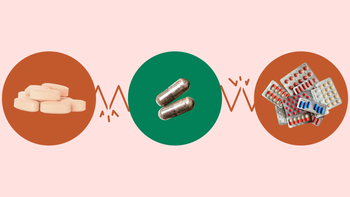
Are You Getting Enough Zinc? 10 Signs of Zinc Deficiency
Key takeaways:
Zinc is an important mineral that your body needs everyday. You can get it from foods such as oysters, beef, and pumpkin seeds. Zinc supplements are also available.
Low zinc levels can lead to symptoms such as loss of appetite, hair loss, and fatigue. Extreme zinc deficiency can impair immune function and affect wound healing.
If you have symptoms of zinc deficiency, your primary care provider can do a blood test to determine your zinc level. They may recommend zinc-rich foods or supplements depending on your level.
Table of contents

Zinc is a trace mineral that we all need in our daily diet. It plays many roles in the body, ranging from protecting bone health to supporting the immune system.
While zinc deficiency is not common in the U.S., it can be serious when it does occur. Zinc deficiency can impair immune function, cause memory loss, and affect your sense of taste and smell. So it’s important to know the signs of zinc deficiency and see a healthcare professional if needed.
Why is zinc important?
Zinc is an essential mineral in the diet. It plays a vital role in many body systems.
Search and compare options
Zinc helps the immune system run properly. It helps your cells fight off bacteria and viruses that can make you sick. And if you have a cut or other wound, zinc helps ensure that it heals properly.
Your bones also rely on zinc. It’s one of the minerals required for normal bone regeneration. Zinc also reinforces the structure of your bones, which protects against bone loss and diseases such as osteoporosis.
Zinc also plays a role in:
Smelling and tasting
Growing and developing, in children
Making enzymes
Making new DNA
Dividing cells
Ensuring insulin works properly
Zinc supplements: If you have a zinc deficiency, taking zinc supplements may help. We’ll tell you about the different types of supplements, and how much zinc is too much.
A bone-strengthening diet: Zinc-rich foods are important for bone health. Learn about other foods and vitamins that help your bones.
Is a zinc deficiency causing your hair loss? Not necessarily. You might have an iron deficiency, a more common disease that can also lead to hair loss.
What are the best sources of zinc?
The best sources of zinc are seafood (especially oysters), beef, and fortified breakfast cereals.
Fruits and vegetables aren’t good sources of zinc.
Adults need 8 mg (female) or 11 mg (male) of zinc per day. The table below shows the amount of zinc found in some common foods:
Food | Amount | Zinc (mg) |
Oysters | 3 oz | 30 mg |
Beef | 3 oz | 3.8 mg |
Crab | 3 oz | 3.2 mg |
Pumpkin seeds | 1.5 oz | 3.3 mg |
Hemp seeds | 1.5 oz | 2.9 mg |
Fortified breakfast cereal | 30 g | 2.8 mg |
Cashews | 1.5 oz | 2.4 mg |
Oats | 1 cup, cooked | 2.3 mg |
Pork | 3 oz | 1.0 mg |
Turkey | 3 oz | 1.5 mg |
Cheddar cheese | 1.5 oz | 1.5 mg |
Tofu, firm | 3 oz | 1.5 mg |
Lentils | ½ cup, cooked | 1.4 mg |
Greek yogurt | 6 oz | 1 mg |
Can you get too much zinc?
Yes, you can get too much zinc. The upper intake level for zinc is 40 mg per day. Consistently getting too much zinc can lead to:
Nausea
Headaches
Dizziness
Stomach aches
Vomiting
It’s unlikely that you’ll get too much zinc from foods, unless you eat a lot of oysters. However, long-term use of zinc supplements can be problematic. So can long-term use of denture creams that contain 50 mg or more of zinc. Too much supplemental zinc can also reduce immune function and lower levels of the “good” cholesterol, high-density lipoprotein (HDL).
What are the signs of zinc deficiency?
A low intake of zinc can lead to zinc deficiency. The signs of zinc deficiency include:
Loss of appetite
Hair loss
Rash
Fatigue
Irritability
Changes in taste
Impaired ability to smell
Slow healing of wounds
Impaired immune system
Memory loss
Read more like this
Explore these related articles, suggested for readers like you.
Who’s most at risk of a zinc deficiency?
The good news is that most people in the U.S. get enough zinc in their diet. But there are certain groups that are at higher risk for zinc deficiency, including:
Older adults
People following vegan diets
People with alcohol use disorder
Talk to a healthcare professional if you fall into any of these groups. They can advise you on whether you need zinc supplements to make up for deficiencies.
Older adults
The risk of zinc deficiency increases with age. For example, about one-third of people in their 60s are deficient in zinc. That amount increases to almost half in people over age 80.
Zinc deficiency is more common in older adults with poor food intake, or those who don’t eat meat. Poor zinc absorption and chronic inflammation also contribute to zinc deficiency in older adults.
People with absorption issues
Your intestines may not absorb zinc properly if you have a gastrointestinal disease, such as:
Crohn’s
Colitis
Celiac disease
Up to 40% of people with Crohn’s or colitis may have zinc deficiency. And zinc deficiency is found in about 2 in every 5 people with celiac disease. If you had bariatric (weight loss) surgery, you may also have difficulty absorbing zinc.
People following a vegan diet
As we said above, the best sources of dietary zinc include meat, seafood, and poultry. So people following a vegan diet are at increased risk of zinc deficiency.
Zinc can be found in plant-based foods such as grains, nuts, and beans. However, these foods contain phytates, which bind zinc and make it harder for the body to absorb.
Pregnancy
The need for zinc increases during pregnancy and when nursing. If these needs are not met, a zinc deficiency can develop. In the U.S., 1 in 10 of pregnant women have zinc intake below the recommended levels. This can result in babies with low birth weight. It also increases the risk of preeclampsia (high blood pressure during pregnancy).
Alcohol use disorder
Heavy alcohol use can also put you at risk of zinc deficiency. In fact, up to half of all people with alcohol use disorder have low zinc levels. This is likely due to a combination of factors, including low zinc intake, poor absorption, and increased passing of zinc in urine.
Sickle cell disease
There is a high rate of zinc deficiency in people with sickle cell disease. This is because chelation therapy, one treatment option for sickle cell, removes metals like iron and zinc from the blood.
What should you do if you think you are zinc deficient?
If you don’t eat many foods that contain zinc, or you have the symptoms of zinc deficiency, talk to your primary care provider. They can perform a blood test to check your zinc level. If your zinc is too low, they can recommend supplements or foods to increase your zinc intake.
Your primary care provider can recommend the right supplement dose, which will depend on your current zinc level and your deficiency symptoms.
The bottom line
It’s easy to get enough zinc in a balanced diet, but zinc deficiency can still occur. It’s most common in older adults, people following vegan diets, and people with alcohol use disorder. If you notice symptoms such as low appetite, hair loss, and a rash, or if you have trouble with your sense of taste and smell, talk to a healthcare professional. They can test for low zinc levels and recommend treatment.
Why trust our experts?


References
Amin, N., et al. (2020). Journal of trace elements in medicine and biology. Journal of Trace Elements in Medicine and Biology.
Cabrera, Á. J. (2015). Zinc, aging, and immunosenescence: An overview. Pathobiology of Aging & Age Related Diseases.
Ceylan, M. N., et al. (2020). Is zinc an important trace element on bone-related diseases and complications? A meta-analysis and systematic review from serum level, dietary intake, and supplementation aspects. Biological Trace Element Research.
Johnson, L. E. (2023). Zinc deficiency. Merck Veterinary Manual.
Klein, L., et al. (2023). Selenium, zinc, and copper status of vegetarians and vegans in comparison to omnivores in the Nutritional Evaluation (NuEva) study. Nutrients.
Lin, S., et al. (2022). Association between bone trace elements and osteoporosis in older adults: A cross-sectional study. Therapeutic Advances in Musculoskeletal Disease.
Miranda, C. T. O. F., et al. (2022). Zinc in sickle cell disease: A narrative review. Journal of Trace Elements in Medicine and Biology.
Office of Dietary Supplements. (2022). Zinc. National Institutes of Health.
Rabinovich, D., et al. (2023). Zinc. StatPearls.
Siva, S., et al. (2016). Zinc deficiency is associated with poor clinical outcomes in patients with inflammatory bowel disease. Inflammatory Bowel Diseases.
Skalny, A. V., et al. (2017). Zinc deficiency as a mediator of toxic effects of alcohol abuse. European Journal of Nutrition.
Wessels, I., et al. (2021). Dietary and physiological effects of zinc on the immune system. Annual Review of Nutrition.
Yokokawa, H., et al. (2024). Demographic and clinical characteristics of patients with zinc deficiency: Analysis of a nationwide Japanese medical claims database. Scientific Reports.





























